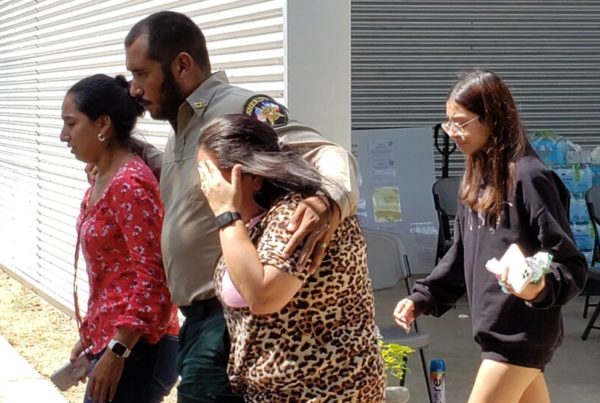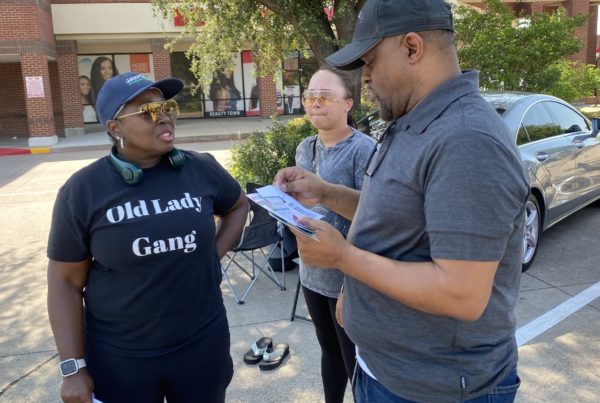When the pandemic pushed more people outdoors because it was a safer way to socialize, many found solace connecting with nature – going on a hike, bird watching or getting their hands dirty with some gardening.
Some of those new gardeners turned to TikTok for tips and inspiration. There, they found Garden Marcus, a plant whisperer, mindfulness enthusiast and content creator of wholesome content. He lives in Spring, Texas. Now, the man behind Garden Marcos, Marcus Bridgewater, has written a new book called “How To Grow: Nurture Your Garden, Nurture Yourself.” Listen to the interview above or read the transcript below.
This transcript has been edited lightly for clarity:
Texas Standard: How did you make the connection between caring for your plants and caring for yourself?
Marcus Bridgewater: I made the connection because I realized we can’t make anything grow, but we can foster environments where things want to grow. And as I was working in the garden and that epiphany hit me, it was like, oh my goodness, all these other things lined up. The plants are all trying to grow and so are people.
And more often than not, we have to overcome the obstacles. But so many of the obstacles are consistent when you consider their soil and sunlight, when you consider there is community and environment and how those things on every scale matter to plants. The same has to be said about human beings. And the more I spend time with my hands in the soil, the more those parallels became obvious.
Well, I hate to put you on the spot, but I will anyway. And ask, is there an instance that comes to mind of when you were working in the garden and you came across something that that that helped with your mental health in the day-to-day.
Yes, there were several times when I was in the garden and I was just walking around the garden and I might have had a troublesome day. But that particular time in the garden, I felt relaxed. I felt more at peace. I felt myself finding a clear thought process through whatever it was that I was dealing with in my day. And the more that started to happen, the more I realized, well, that’s the garden. That’s me and the connection with my plant companions. And so it was like, oh, wow, this is really good for me. And then come to find out, actually, it is great for me.
When you say come to find out, what was that process?
Well, I knew that it was making a difference in my life. But when I found out how much of a difference it was making in the lives of the people around me, I realized it went from being good for me to being great for me because now I’m not just bettering myself. I’m also helping my community.
What have you heard from people? You’ve been doing this for about two years or so now, putting these messages on social media. What have you heard from folks in that time?
Oh, all kinds of things. I’ve heard thank you’s. I’ve heard some people say they are happy that they felt tricked. They were like, ‘oh, I thought I was here for gardening. And it turns out I was here for some self-empowerment. That’s incredible. Thank you. And also, I see what you did there.’
Some people have sent a really heartfelt messages and letters saying that the concepts have really touched them and changed the way they interact with their environment and their family. I talk a lot about kindness, patience and positivity and how we can see those same concepts promoting growth in our garden, so we can see those same concepts promoting growth in our community. People have come back to me and said they’ve started trying to implement kindness, patience, positivity in their lives. Those types of things have been so humbling and so inspiring to keep gardening and to keep finding parallels that will help people.
As you’re gardening, are you actively trying to think of these parallels or do they just kind of come to you?
They just kind of come to me. I have the great fortune – or burden, depending on which way you decide to look at it – of having a brain that fires all the time. And so I’m constantly thinking of just the cosmicness that is life and the vastness that is connection and all the scales that it exists on. And so because of that, again, the garden makes for an incredible canvas to study from.
As people read this book, which is filled with your story, as well as a lot of the wisdom that you have gleaned from spending time in your garden, what do you really hope folks take away from it when they get their chance to read it?
Well, a few things, but I think the biggest thing is that we all have potential to grow and we can focus on that growth and foster that growth. And the more that we do that, the more we will see the things that are in the way of our growth. And so then we can be really pragmatic in finding solutions to those things that are inhibiting growth so we can go back to actual growing.
I saw a video of you talking about this just today. The and the pothos and the aloe. Yeah. Do you mind just, just describing what you found with your pothos and your aloe not too long ago?
I found that the pothos had reached out and grasped onto the aloe’s cloth planter.
And the pothos is kind of a vine type plant.
Yes, it is. It is a vining plant and I see it a lot in Florida, growing up trees. And so it wants to attach to something so that it can help it support its growth and then grow upward. And so it reached out and found the cloth planter and was using the cloth planter to grow upward. But what happened was, because the cloth planter was in its location, it was actually now preventing the plant from being moved and thereby from being able to grow out even further. And so I had to separate the vine from the planter. And so that reminded me that sometimes the things that you’re using to help you grow, you have to let go of if you are to keep growing.


















